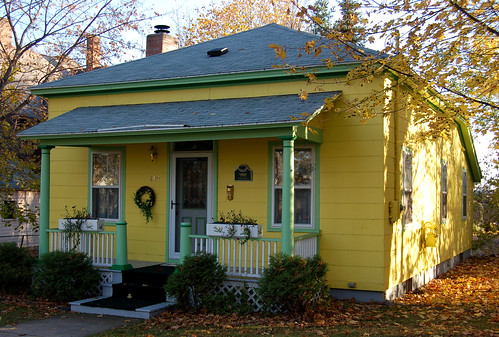Just finished Dandelion Cottage, by Carroll Watson Rankin. 1904, middle-grade by today’s categories: four girls get to use a delapidated cottage, owned by the church on their block, as a summer play-house. I checked it out because Beverly Cleary mentioned in A Girl from Yamhill that it was a childhood favorite of hers. (And I see, browsing Goodreads, that I’m not the only one who read it for that reason.) There is lots of housecleaning! And entertaining a real live boarder for three weeks, and a culminating dinner party for the kindly landlord and favorite neighbor.
One thing stood out compared to contemporary books: the rotten new girl who steals, wrecks stuff, and otherwise makes things no fun doesn’t get the note of sympathy or redemption that would be required now. Laura’s parents are mean and negligent, and although the four Dandelion Cottage girls keep reminding each other not to sink to her level, no adult or narrator points out that Laura hasn’t really had friends before, has a tough family life, et cetera. I wonder when sympathy for bullies and “bad kids” became de rigueur– sometime before Mary Stolz’ A Dog on Barkam Street led to The Bully of Barkham Street in 1963?
There are two brief mentions of playing Indian, early in the book. No other content warnings that I can recall.
Dandelion Cottage would make a lovely pair with Elizabeth Enright’s 1958 Gone-Away Lake. And it has a school-story sequel called Girls of Highland Hall, which I have snagged to read on my phone.
The rest of my current reads:
- The Swan and the Seal, by Kristi Lee. She went indie with her sequel to the m/m novella Surprised At Nothing and changed the point of view to my favorite character!
- The Amulet of Samarkand, by Jonathan Stroud. Audiobook. I like the relatively subtle questioning of right-and-wrong, and Simon Jones does a wonderful sardonic Bartimeus! The disappointment is that I was sure Martha Underwood would turn out to be sneaky and powerful. She got Nathan’s real name out of him in the first five minutes! She walked right in on her husband’s meeting with Lovelace! But no, apparently not. :(
- The Boy in the Black Suit, by Jason Reynolds. He has such a strong, easy prose style. It makes me feel like I know the characters, like we hang out all the time.
- Year of the Griffin, by Diana Wynne Jones. I think I’ll always have a book of hers at hand for odd moments, because something interesting happens on every single page. Moment-to-moment interestingness.
